Submitted:
02 June 2023
Posted:
02 June 2023
You are already at the latest version
Abstract
Keywords:
1. Introduction
- Achieving the agreement between the synthetic model (digital twin) and real-live data – that is the match between the data recorded by the real magnetometers and the data recorded in the virtual environment.
- Obtaining the efficiency of the virtual environment, that is the need for very fast calculations of the digital twin, which result from the necessity of many recalculations of the digital model – different shapes of the identifying elements, different geographical orientation
- Meshing problem considering the size of the 3D virtual environment that is a few meters large and the size of the UXO object that has walls a few millivoltmeters thick.
- Introducing digital twin for UXO classification for magnetic data including remanent magnetization
- Empirical verification of the digital twin using data from physical experiments obtained using magnetometer sensor
- Introducing a way for computational complexity reduction without sacrificing the results obtained from the digital twin
- Identifying important properties of the digital twin which need to be implemented in order to achieve high comparability between physical data and numerical model
- Introducing the way to create a dataset with multiple parallel virtual probes
2. Related work
3. The digital twin model
3.1. Mathematical formulations
3.2. Modelling environment
3.3. Model simplification
4. Digital twin validation setup
4.1. Empirical experiments
4.2. Digital twin experiments
4.3. Data processing and signal comparison process
- N - the length of the signal recorded with a numerical model
- M - the length of the signal recorded with the physical model
- - the values of the signal recorded using physical model
- - the values of the signal recorded using digital twin
- - the number of samples the signal need to be moved forward or backward to align signal
- Root Mean Square Error (RMSE) - calculated as:
- Mean Absolute Error (MAE) - calculated as:
- - calculated as: where , and
5. Evaluation of the twin validation process
- UXO orientation - north-south, scanning route orientation north-south
- UXO orientation - north-south, scanning route orientation east-west
- UXO orientation - east-west, scanning route orientation east-west
- UXO orientation - east-west, scanning route orientation north-south
- UXO orientation - northeast-southwest, scanning route orientation east-west
- UXO orientation - northeast-southwest, scanning route orientation north-south
- UXO orientation - perpendicularly, scanning route orientation north-south
- UXO orientation - perpendicularly, scanning route orientation east-west
6. The training set creation procedure
- strength and orientation (inclination) of the Earth’s magnetic field for the area for which experimental work was carried out (considered in the boundary conditions of the model),
- dimensions and orientation of the UXO and potentially other objects,
- material properties of this object (magnetic permeability, magnetization),
- mesh density.
7. Conclusions
Author Contributions
Funding
Conflicts of Interest
References
- Przeciwdziałanie zagrożeniom wynikającym z zalegania materiałów niebezpiecznych na dnie Morza Bałtyckiego. Technical Report 192/2019/P/19/068/LGD, Najwyższa Izba Kontroli, 02-056 Warszawa, ul. Filarowa 57, 2020.
- Heagy, L.J.; Oldenburg, D.W.; Pérez, F.; Beran, L. Machine learning for the classification of unexploded ordnance (UXO) from electromagnetic data. In Proceedings of the SEG International Exposition and Annual Meeting. OnePetro; 2020. [Google Scholar]
- Núñez-Nieto, X.; Solla, M.; Gómez-Pérez, P.; Lorenzo, H. GPR signal characterization for automated landmine and UXO detection based on machine learning techniques. Remote sensing 2014, 6, 9729–9748. [Google Scholar] [CrossRef]
- Deschaine, L.M.; Hoover, R.A.; Skibinski, J.N.; Patel, J.J.; Francone, F.; Nordin, P.; Ades, M. Using Machine Learning to Complement and Extend the Accuracy of UXO Discrimination Beyond the Best Reported Results of the Jefferson Proving Ground Technology Demonstration. SIMULATION SERIES 2002, 34, 46–52. [Google Scholar]
- Beran, L.; Zelt, B.; Billings, S. Detecting and classifying UXO. J. ERW Mine Action 2013, 17, 57–63. [Google Scholar]
- Furey, J.S.; Butler, D.K. The physical dipole model and polarizability for magnetostatic object parameter estimation. Journal of Environmental & Engineering Geophysics 2011, 16, 49–60. [Google Scholar]
- Wang, H.; Chen, S.; Zhang, S.; Yuan, Z.; Zhang, H.; Fang, D.; Zhu, J. A high-performance portable transient electro-magnetic sensor for unexploded ordnance detection. Sensors 2017, 17, 2651. [Google Scholar] [CrossRef] [PubMed]
- Gavazzi, B.; Le Maire, P.; de Lépinay, J.M.; Calou, P.; Munschy, M. Fluxgate three-component magnetometers for cost-effective ground, UAV and airborne magnetic surveys for industrial and academic geoscience applications and comparison with current industrial standards through case studies. Geomechanics for Energy and the Environment 2019, 20, 100117. [Google Scholar] [CrossRef]
- Fassbinder, J.W. Magnetometry for archaeology. Encyclopedia of geoarchaeology, 2017; pp. 499–514. [Google Scholar]
- Ding, Z.; Yuan, J.; Long, X. Design and optimization of a high-sensitivity radio-optical cesium magnetometer. Optics & Laser Technology 2019, 119, 105573. [Google Scholar]
- Goodson, R.A.; Morgan, J.C.; Butler, D.K.; Fields, M.P.; Bennett Jr, H.H.J.; Demoss, T. Unexploded Ordnance (UXO) Data Analysis System (DAS) 2009.
- Churchill, K.M.; Link, C.; Youmans, C.C. A comparison of the finite-element method and analytical method for modeling unexploded ordnance using magnetometry. IEEE transactions on geoscience and remote sensing 2011, 50, 2720–2732. [Google Scholar] [CrossRef]
- Shubitidze, F.; Fernández, J.; Barrowes, B.; O’Neill, K.; Shamatava, I.; Bijamov, A. Comparison of the physically complete model with a simple dipole model for UXO detection and discrimination. In Proceedings of the Detection and Sensing of Mines, Explosive Objects, and Obscured Targets Xv. SPIE, 2010, Vol. 7664; pp. 81–92.
- Pasion, L.R.; Billings, S.D. Dipole Models for UXO Discrimination at Live Sites. Technical report, Black Tusk Geophysics Vancouver Canada, 2017.
- Butler, D.K.; Simms, J.E.; Furey, J.S.; Bennett, H.H. Review of magnetic modeling for UXO and applications to small items and close distances. Journal of Environmental and Engineering Geophysics 2012, 17, 53–73. [Google Scholar] [CrossRef]
- Butler, D.K.; Pasion, L.; Billings, S.D.; Oldenburg, D.; Yule, D.E. Enhanced discrimination capability for UXO geophysical surveys. In Proceedings of the Detection and Remediation Technologies for Mines and Minelike Targets VIII. SPIE, 2003, Vol. 5089; pp. 958–969.
- Zuo, B.; Wang, L.; Chen, W. Full tensor eigenvector analysis on air-borne magnetic gradiometer data for the detection of dipole-like magnetic sources. Sensors 2017, 17, 1976. [Google Scholar] [CrossRef] [PubMed]
- Wang, L.; Zhang, S.; Chen, S.; Luo, C. Fast Localization and Characterization of Underground Targets with a Towed Transient Electromagnetic Array System. Sensors 2022, 22, 1648. [Google Scholar] [CrossRef] [PubMed]
- Hart, S.J.; Shaffer, R.E.; Rose-Pehrsson, S.L.; McDonald, J.R. Using physics-based modeler outputs to train probabilistic neural networks for unexploded ordnance (UXO) classification in magnetometry surveys. IEEE Transactions on Geoscience and Remote Sensing 2001, 39, 797–804. [Google Scholar] [CrossRef]
- Billings, S. Data Modeling, Feature Extraction, and Classification of Magnetic and EMI Data, ESTCP Discrimination Study, Camp Sibert, AL. Demonstration Report. Technical report, SKY RESEARCH ASHLAND OR, 2008.
- Bijamov, A.; Shubitidze, F.; Fernandez, J.P.; Shamatava, I.; Barrowes, B.E.; O’Neill, K. Comparison of supervised and unsupervised machine learning techniques for UXO classification using EMI data. In Proceedings of the Detection and Sensing of Mines, Explosive Objects, and Obscured Targets XVI. SPIE, 2011, Vol. 8017; pp. 56–66.
- Bray, M.P.; Link, C.A. Learning machine identification of ferromagnetic UXO using magnetometry. IEEE Journal of Selected Topics in Applied Earth Observations and Remote Sensing 2014, 8, 835–844. [Google Scholar] [CrossRef]
- Schultze, V.; Schillig, B.; IJsselsteijn, R.; Scholtes, T.; Woetzel, S.; Stolz, R. An optically pumped magnetometer working in the light-shift dispersed M z mode. Sensors 2017, 17, 561. [Google Scholar] [CrossRef] [PubMed]
- Nunes, A.S.; Dular, P.; Chadebec, O.; Kuo-Peng, P. Subproblems Applied to a 3-D Magnetostatic Facet FEM Formulation. IEEE Transactions on Magnetics 2018, 54, 1–9. [Google Scholar] [CrossRef]
- Magnetostatics, Theory. https://www.comsol.com/multiphysics/magnetostatics-theory, 2019.
- Geuzaine, C.; Remacle, J.F. Gmsh: A 3-D finite element mesh generator with built-in pre-and post-processing facilities. International journal for numerical methods in engineering. 2009, 11, 1309–1331. [Google Scholar] [CrossRef]
- of Suppl Publication Chief Inspector of Armaments, A.M. Ammunition bulletine no 51. https://stephentaylorhistorian.files.wordpress.com/2020/02/ammunition-bulletin-no-51.pdf, 1946.
- Gov, U. German explosive ordnance vol. 2. https://stephentaylorhistorian.files.wordpress.com/2020/09/op-1666-german-explosive-ordnance-volume-2.pdf, 1946.
- Geuzaine, C. GetDP: A general finite-element solver for the de Rham complex. In PAMM: Proceedings in Applied Mathematics and Mechanics 2007, 7, 1010603–1010604. [Google Scholar] [CrossRef]
- Bourke, P. Cross correlation. Cross Correlation”, Auto Correlation—2D Pattern Identification 1996.
| 1 | SICN -signed inverse condition number |
| 2 | Gamma - inscribed radius / circumscribed radius |
| 3 | SIGE - signed inverse error on the gradient of FE solution |
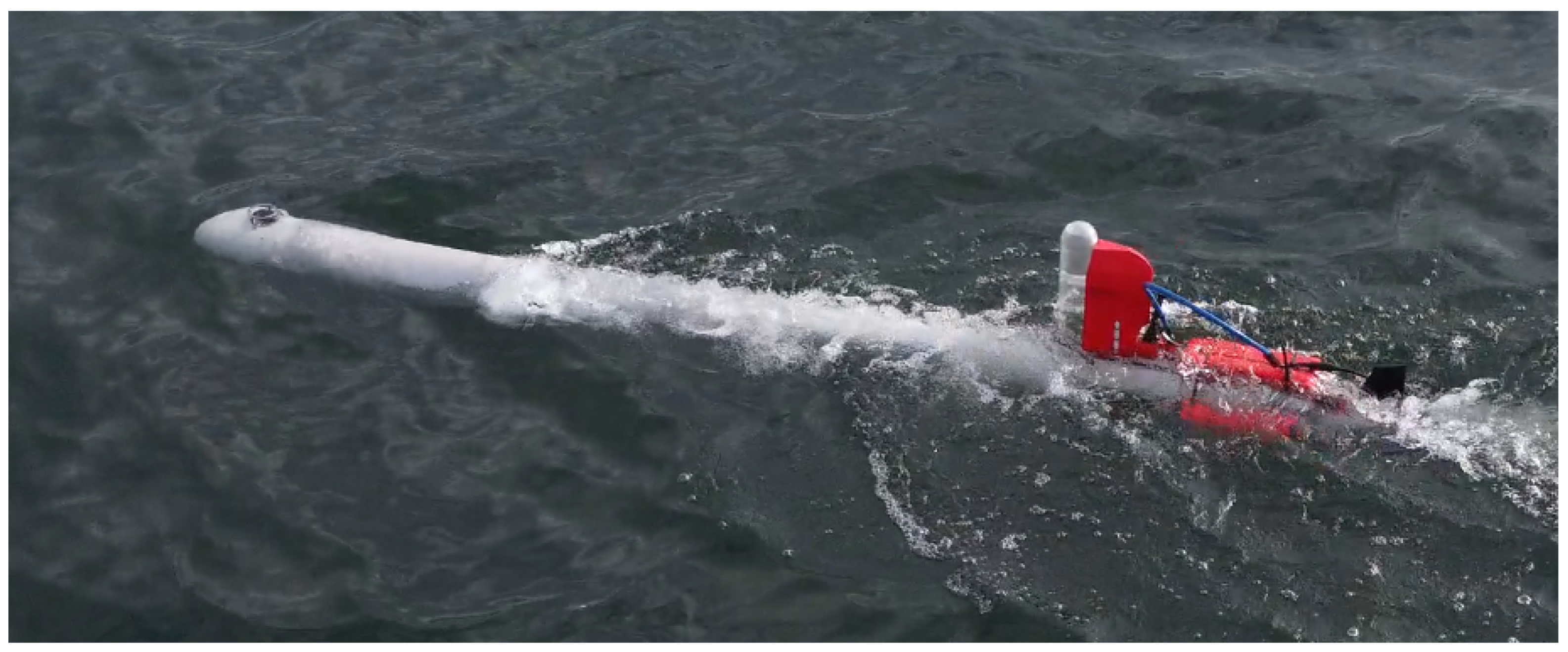
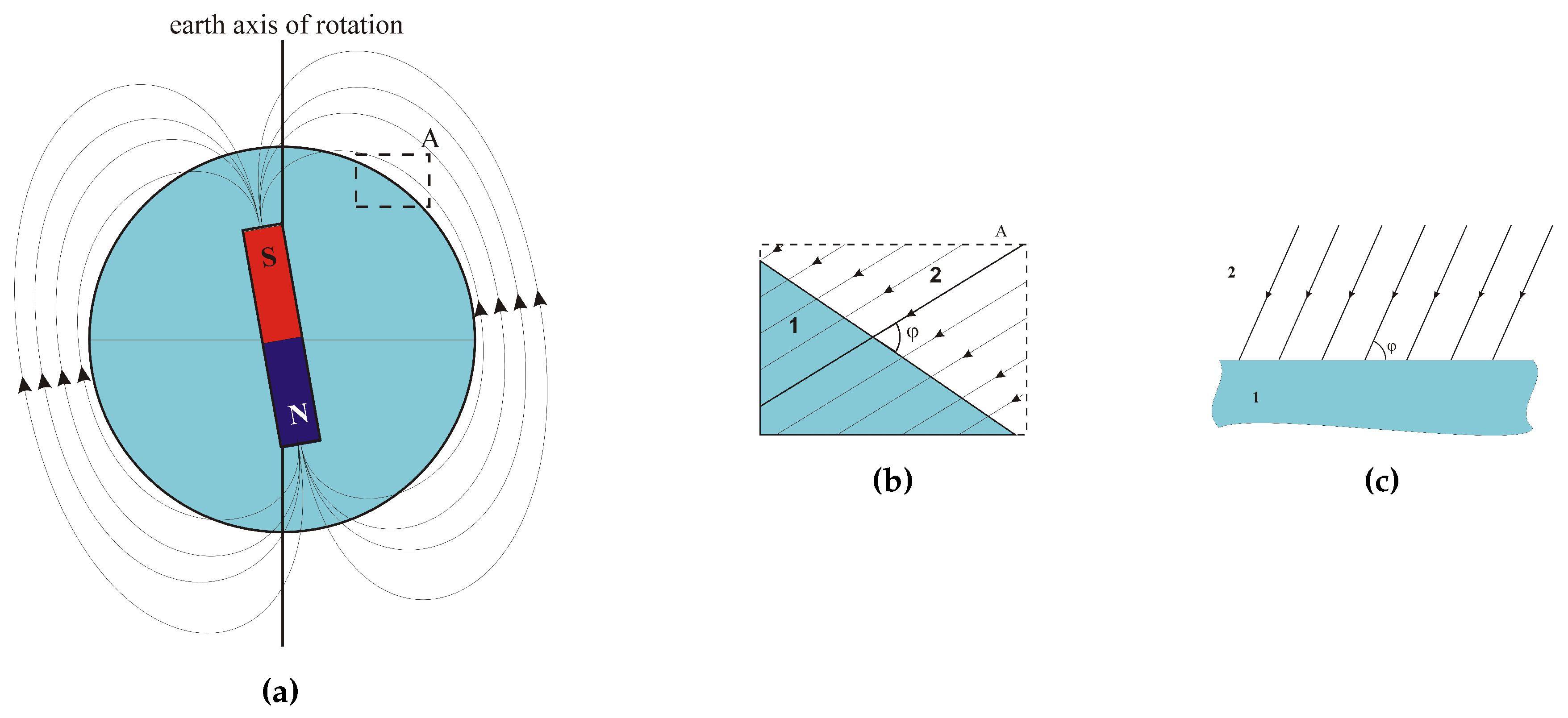
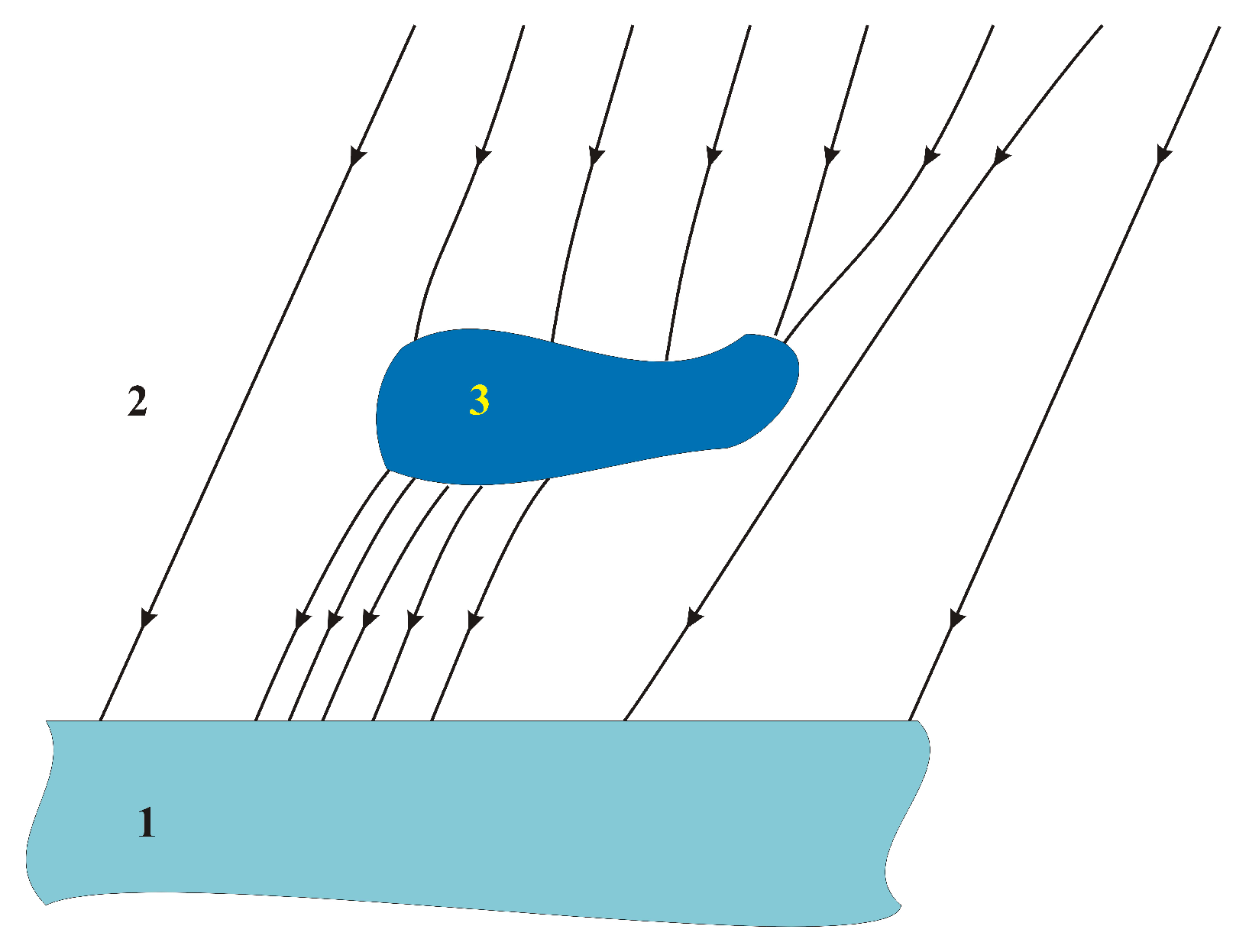

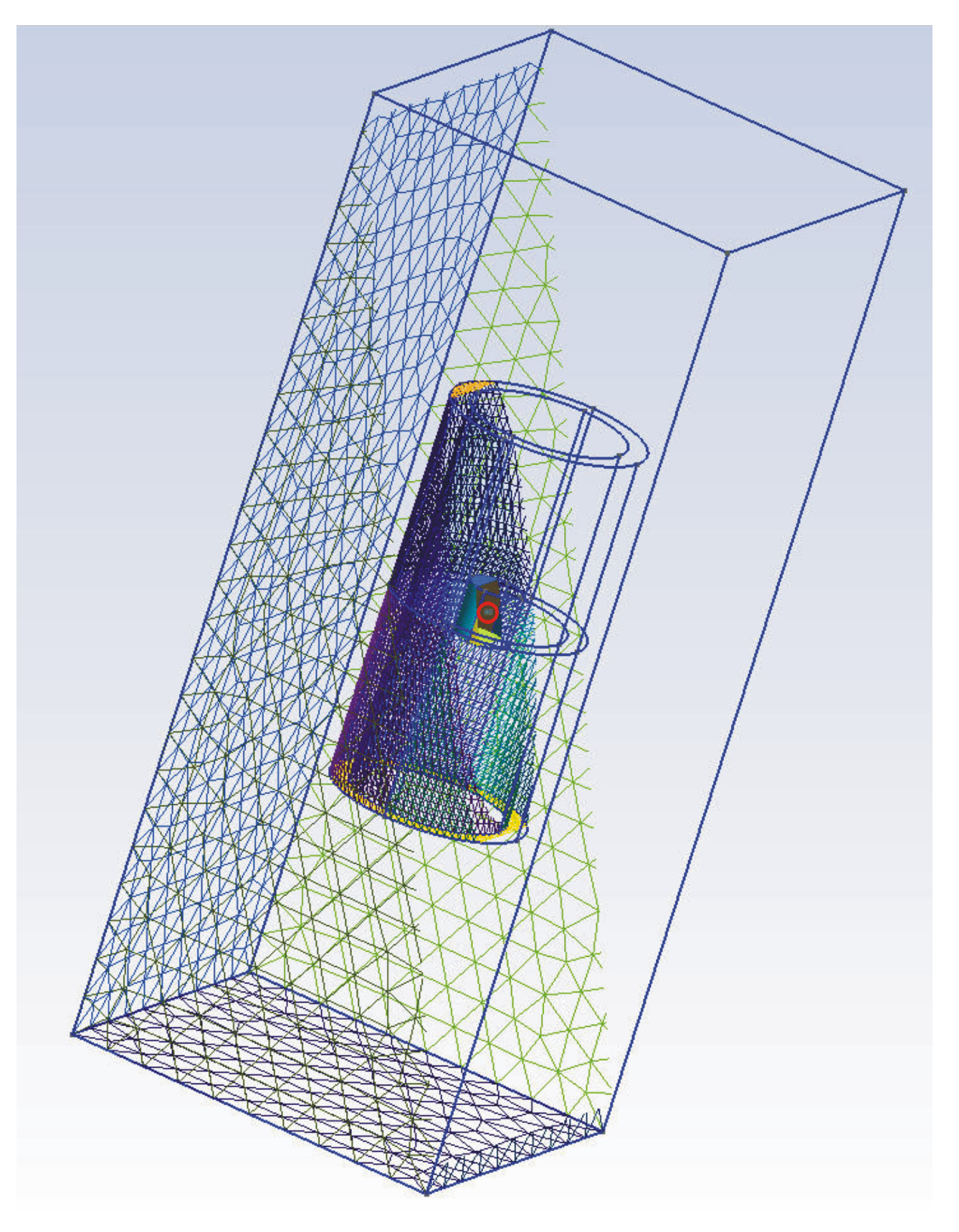
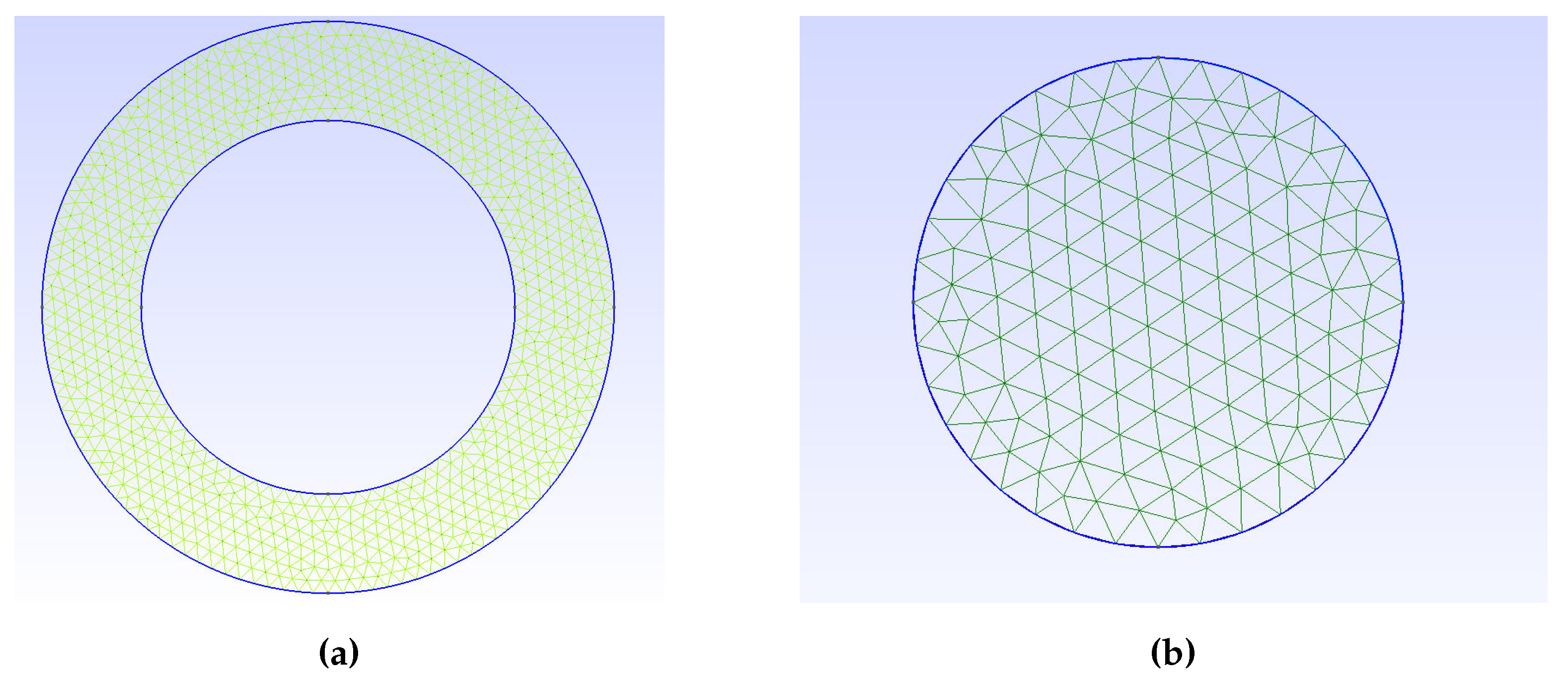

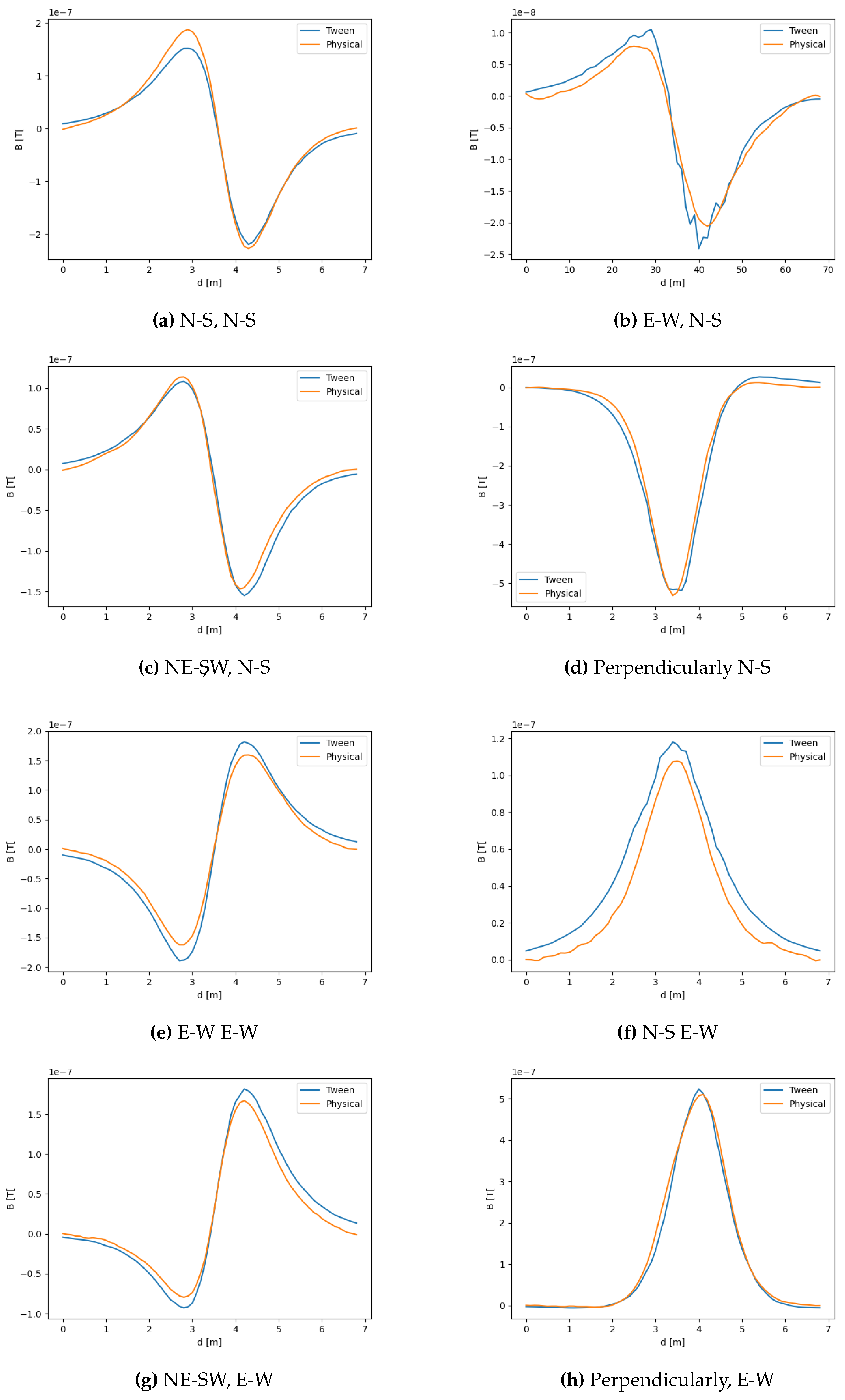
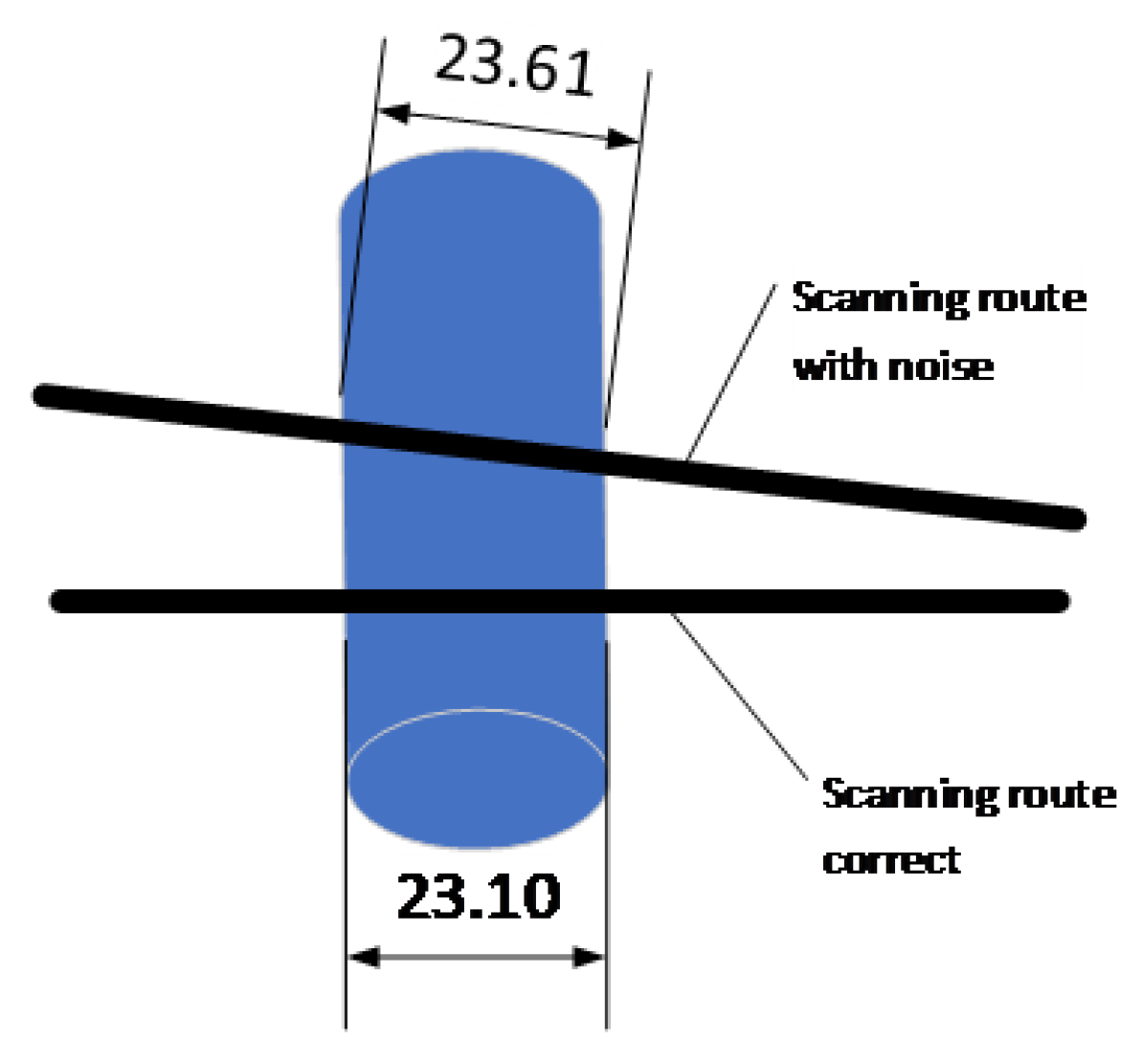
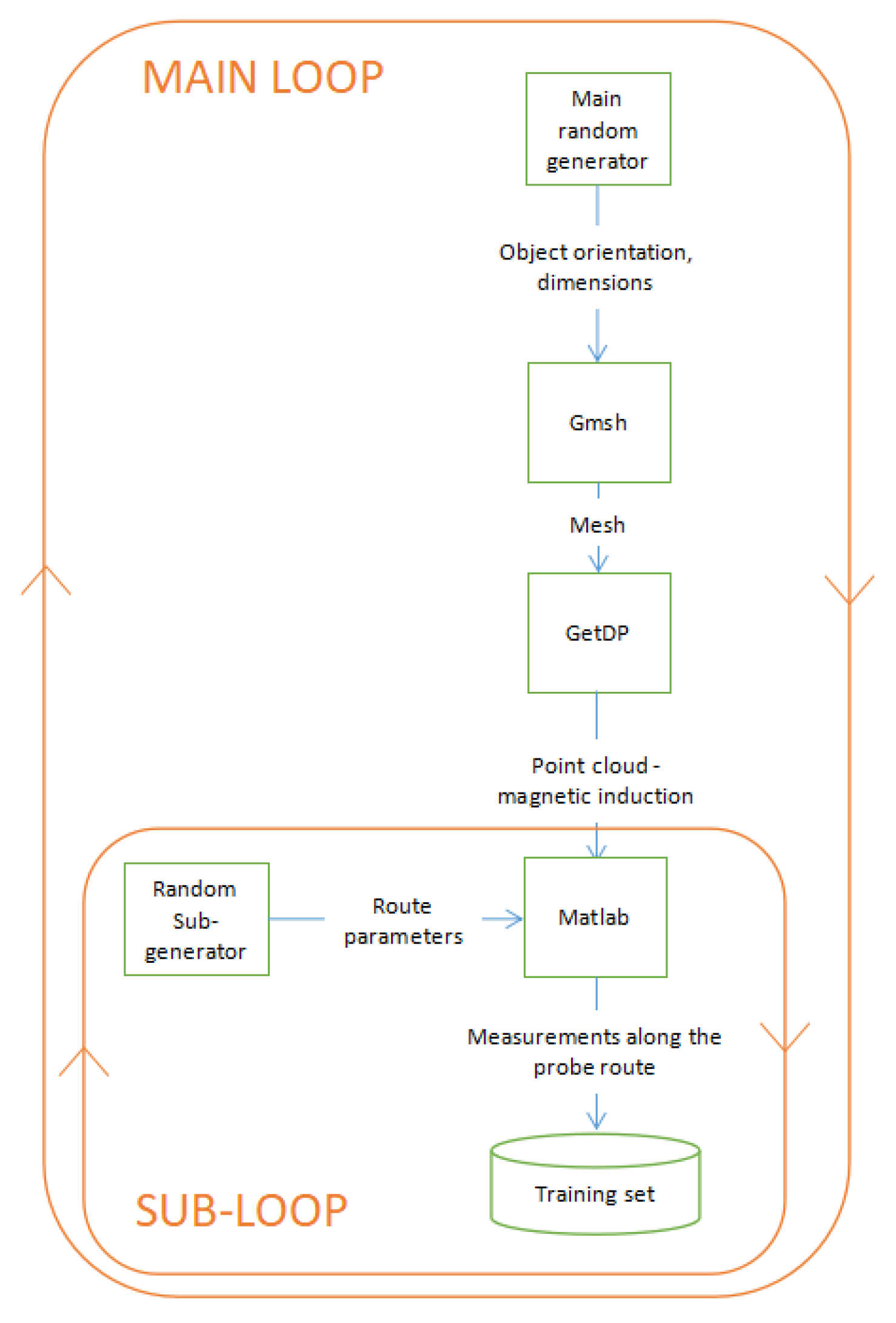
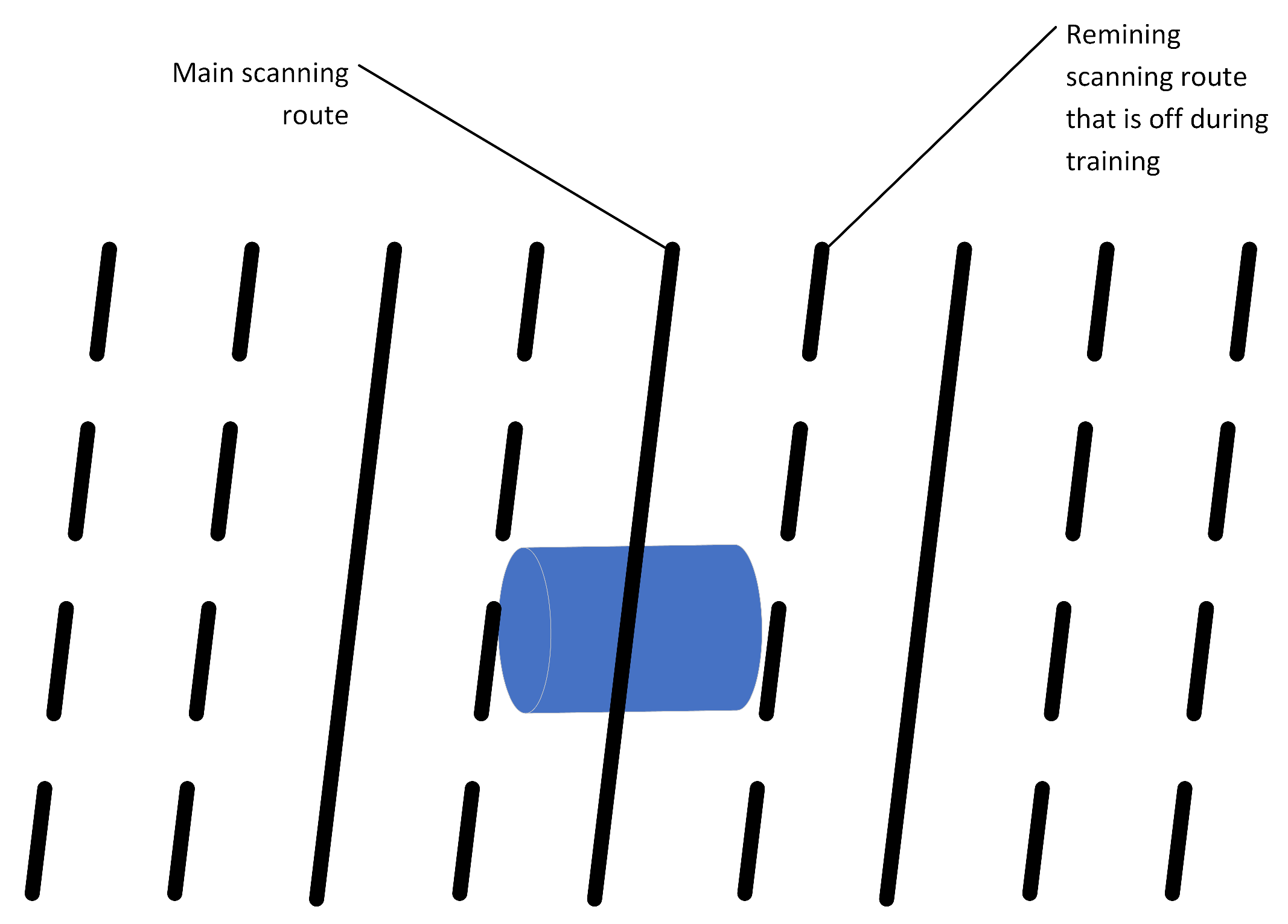
| SICN | Gamma | SIGE |
|---|---|---|
| 0.5164 | 0.4928 | 0.7164 |
| Model | SICN | Gamma | SIGE |
|---|---|---|---|
| pipe | 0.5164 | 0.4928 | 0.7164 |
| cylinder | 0.5784 | 0.5504 | 0.7383 |
| Model | SICN | Gamma | SIGE | Nodes number | Calculation time |
|---|---|---|---|---|---|
| pipe | 0.6439 | 0.6085 | 0.7444 | 155215 | 00:32:56.6805432 |
| cylinder | 0.6945 | 0.6486 | 0.7517 | 78601 | 00:13:15.7674002 |
| UXO orientation | Scanning orientation | RMSE | MAE | MAX-MIN | |
|---|---|---|---|---|---|
| N-S | N-S | 0.9849 | 1.37E-08 | 1.04E-08 | 4.15E-07 |
| E-W | N-S | 0.9507 | 1.79E-09 | 1.49E-09 | 2.85E-08 |
| NE-SW | N-S | 0.9850 | 8.50E-09 | 7.14E-09 | 2.61E-07 |
| Perpendicularly | N-S | 0.984168 | 2.08E-08 | 1.64E-08 | 5.44E-07 |
| E-W | E-W | 0.9687 | 1.57E-08 | 1.46E-08 | 3.22E-07 |
| N-S | E-W | 0.8724 | 1.24E-08 | 1.15E-08 | 1.08E-07 |
| NE-SW | E-W | 0.9680 | 1.22E-08 | 1.09E-08 | 2.46E-07 |
| Perpendicularly | E-W | 0.9933 | 1.38E-08 | 8.90E-09 | 5.14E-07 |
| UXO orientation | Scanning orientation | RMSE | MAE | MAX-MIN | ||
|---|---|---|---|---|---|---|
| Pipe | N-S | N-S | 0.9849 | 1.37E-08 | 1.04E-08 | 4.15E-07 |
| Cylinder | N-S | N-S | 0.9843 | 1.40E-08 | 1.07E-08 | 4.15E-07 |
Disclaimer/Publisher’s Note: The statements, opinions and data contained in all publications are solely those of the individual author(s) and contributor(s) and not of MDPI and/or the editor(s). MDPI and/or the editor(s) disclaim responsibility for any injury to people or property resulting from any ideas, methods, instructions or products referred to in the content. |
© 2020 by the authors. Licensee MDPI, Basel, Switzerland. This article is an open access article distributed under the terms and conditions of the Creative Commons Attribution (CC BY) license (https://creativecommons.org/licenses/by/4.0/).





